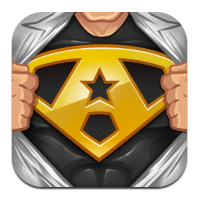Toronto-based startup AppHero launched version 2.0 of its service today, with a brand new interface and big behind-the-scenes changes to how it offers up recommendations to users. AppHero is on a roll, fresh off funding and a spot on NBC this morning, but the app discovery space is a crowded one, and competitors like AppGratis have more international experience and are aggressively targeting the North American market.
But AppHero founder and CEO Jordan Satok thinks that his company is offering up one of the most comprehensive app recommendation engines available for iPhone and iPad owners inundated with a flood of new apps every day. In an email exchange, the young founder was kind enough to share a lot of behind-the-scenes information about how AppHero determines which titles to recommend with which users. As such, we’re able to share with you a very detailed synopsis of the recipe for AppHero 2.0’s secret sauce.
Surprisingly, much of the final process of determining which apps are and aren’t worthy of inclusion in AppHero’s recommendation still falls to human hands: Satok’s specifically. He says he “personally looks” at the crop of apps that remains after AppHero’s sophisticated, automated “app review” process tackles the 772,177 current (as of this writing) active apps in the App Store.
“We’ve built some algorithms that based on around 50 different factors (such as what people are saying about an app, how frequently it’s been updated, and what the other apps the developer has are like), is able to automatically filter out all the junk,” Satok says. “Think about this like a spam filter for apps.”
 Once Satok has run a fine-tooth comb through the results spit out by its collection of filtering algorithms, the startup begins the task of making personalized recommendations. While Apple doesn’t allow third-party developers to see which apps are already on a user’s phone, AppHero (with a user’s consent, and in ways that sidestep Apple’s lack of direct access APIs without running afoul of their rules) is able to determine “with a high degree of accuracy” what apps they already have. That’s crucial to the process, since it prevents duplicate recommendations, and provides data that can be used to draw conclusions around general categories of interest (i.e., if a user has a recipe app and a kitchen timer, they’re probably fans of cooking).
Once Satok has run a fine-tooth comb through the results spit out by its collection of filtering algorithms, the startup begins the task of making personalized recommendations. While Apple doesn’t allow third-party developers to see which apps are already on a user’s phone, AppHero (with a user’s consent, and in ways that sidestep Apple’s lack of direct access APIs without running afoul of their rules) is able to determine “with a high degree of accuracy” what apps they already have. That’s crucial to the process, since it prevents duplicate recommendations, and provides data that can be used to draw conclusions around general categories of interest (i.e., if a user has a recipe app and a kitchen timer, they’re probably fans of cooking).
AppHero has built tech around natural language processing techniques to help it automatically understand when apps offer similar functions. The engine can determine the general function of a particular app (i.e. Real Racing is a car racing game) and then group that with other similar titles (like Need for Speed Shift, for instance). Satok says grouping apps in this way proves much more accurate and useful in formulating useful recommendations than sticking to Apple’s own App Store category and sub-category divisions.
The core of the recommendation magic comes around its ability to analyze tweets, Likes and other aspects of a user’s social graph, which they volunteer when they sign in to their social network profiles on AppHero.
“I can’t go too deep into how we do this, because it’s very core to our business,” Satok explained, “But it’s unique tech because most other recommendation engines (Netflix, Amazon, etc.), are only able to do product based recommendations (i.e., you watched Lord of the Rings so you’ll like the Hobbit), but we’re able to do recommendations across different media types (i.e., you’ll like the TechCrunch app because you’ve liked an article from beta.techcrunch.com on Facebook).”
Other key ingredients of the AppHero 2.0 recipe include improving the text descriptions that appear for each app, by taking not just the top-most content from App Store summaries, but instead finding the meatiest content in the hopes of better articulating to a user what an app actually does. The startup is also geo-tagging apps in its database where appropriate, so that titles relevant to a person’s location will bubble up, and they’re making sure to disambiguate between similarly named spots, so you won’t get recos for apps appropriate to London, England when you live in London, Ontario.
Satok says there are a lot of other projects in the works at AppHero to try and continuously improve the quality of its recommendations. There’s plenty of room for more than one solution in the app discovery space, but users will go back to the service that gives them the best recommendations out of the starting gate, and the underlying tech is the key to winning that race.
